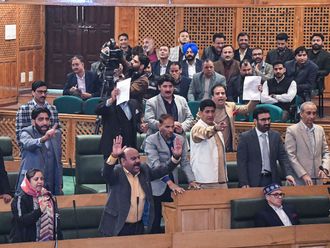
New Delhi: According to Delhi Police statistics, 18 per cent of the 543 murders committed last year were as a direct consequence of failed relationships. And a majority of those involved belonged to well-to-do families.
Psychologists are of the opinion that today's generation is not taught to take ‘no' for an answer and it's this inability to accept rejection that has seen many a love story and alliance ending in tragedy.
Experts say such relationships can be interpreted more as an obsession, than love. It is akin to possessing something and if it cannot belong to them, it has to be destroyed.
For instance: It enraged Amar no end when 19-year-old Pallavi, daughter of a bureaucrat, moved on from their relationship of two years. As her parents fixed her marriage with another boy, Amar, son of a businessman, threatened to commit suicide. When Pallavi continued ignoring him, he took to drugs and sent text messages warning that he would harm her.
Pallavi informed her parents. They took up the matter with Amar's parents, who decided to send their son to a relative in Punjab. Little did they realise that their obsessed son had other plans.
Rejection in love took a violent turn and Amar, who had easy access to money, bought a gun and shot Pallavi dead after convincing her to meet him one last time before he left the city.
Craving for attention
In another case, Chitra killed her husband Deepak, not because he was having an affair, but importantly because he wanted to get out of their two-year-old marriage. The crime was well planned and Chitra admitted she was jealous of the other woman and had intended harming her also.
Says counsellor Latika Gupta, "It is low tolerance to frustration, which is the cause of such impulsive behaviour. The problem is that society is turning high on materialism and egotism. All this is leading to people becoming lonelier. And the need for attention triggers such reactions in them."
"Lack of support systems and the kind of access children had to grandparents some generations back, are missing. Though the Indian family and ties have been changing for quite some time, one of the pillars of society, the joint family, having become a thing of the past, has led to decay in understanding between parents and children," she observed.
A senior police officer agrees. "Absence of grandparents in homes has made the utmost difference to families. Apart from dealing with crimes, we are often approached by parents of wayward children. For fear of social stigma, they do not lodge a complaint against their children, but on some pretext ask us to intervene and put sense in their minds."
The police officer felt that to a certain degree the noticeable shift was more visible in families dwelling in urban India.
"Socio-economic upsurge means additional money to buy gadgets and be able to socialise more. And the urge to show off and be one up on the others has often resulted in youngsters from wealthy families taking to crime," he informed.
Parental void
Putting the onus on parents, psycho-analyst Dr Sanjay Chugh says, "With the pressure to have double income, which necessitates the mother to also work full time, parents get less quality time to spend with children."
This, according to him, cuts down on experiences of learning family values and traditions, which build the core of one's identity and being. And leave people emotionally more vulnerable and fragile.
"Unfortunately, youngsters are not emotionally mature to handle the stress, which complicates matters and makes a situation a lot more difficult. The youth get easily frustrated when things do not result according to their needs or comfort and there is a state of conflict.
"And response to this inability to manage conflict is either aggressive or that of avoidance. If the concept of respecting other's boundaries is not understood properly, chances of relationships becoming ugly are high," Chugh claimed.
Commenting on the increase in crime due to the new-age intolerance for setbacks, he said, "Intolerance to any circumstance that is a deviation from what the mind wants leads to negative feelings, including anger, sadness and jealousy.
"When these feelings continue over a prolonged period of time without any healthy way to vent them out or resolve them, it is bound to agitate the mind. Once they cross the threshold, it can force a person to behave in a manner that could be harmful to self or others," he said.
However, when asked why social parameters were being redefined and from where and why this attitude was coming, Chugh felt, "The statistics revealed by the Delhi Police regarding ‘well-to-do families' could well have been one of the variables for the research done. But one variable is insufficient to define or redefine social boundaries as a whole.
"Limited and singular statistics should not be made as yardsticks. It requires many more studies and research that yield consistent figures, before we make such emphatic statements," he added.
Social media impact
But some experts dealing with criminals on a psychological level admit that the crimes have been committed in urban set-ups where teenagers now have more ‘friends' and relationship issues than ever before. All this was because social media allows them to develop contacts even under the most restrictive circumstances.
"Limit and monitor the use of social networking sites and other gadgets that keep us connected forever," advises Chugh. "It is good to disconnect every now and then to give a break and take out time for one's own self," he recommends.
- 18% of murders in New Delhi traced to broken relationships
- 543 murders in city last year












